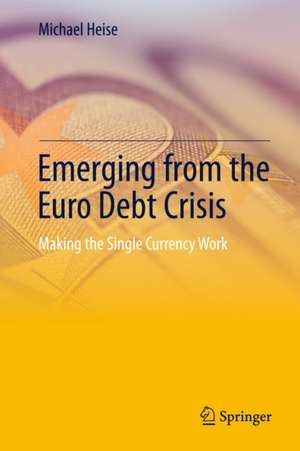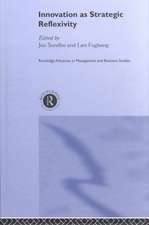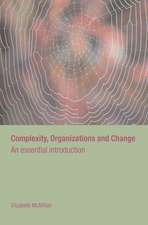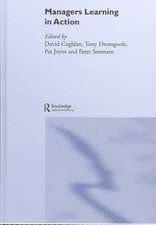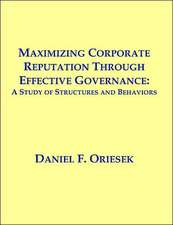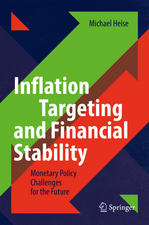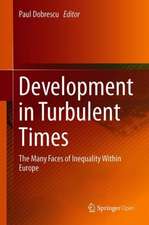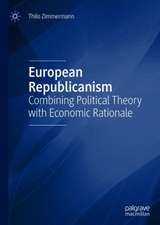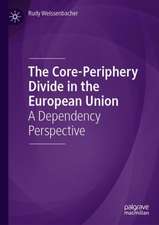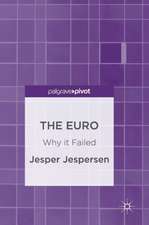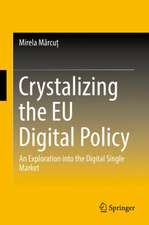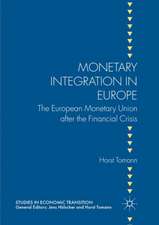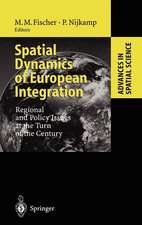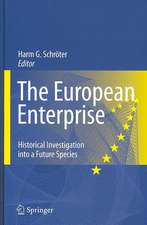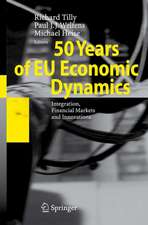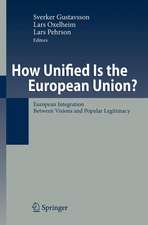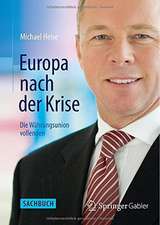Emerging from the Euro Debt Crisis: Making the Single Currency Work
Autor Michael Heiseen Limba Engleză Hardback – 25 iul 2013
| Toate formatele și edițiile | Preț | Express |
|---|---|---|
| Paperback (1) | 379.09 lei 6-8 săpt. | |
| Springer Berlin, Heidelberg – 9 aug 2015 | 379.09 lei 6-8 săpt. | |
| Hardback (1) | 384.86 lei 6-8 săpt. | |
| Springer Berlin, Heidelberg – 25 iul 2013 | 384.86 lei 6-8 săpt. |
Preț: 384.86 lei
Nou
Puncte Express: 577
Preț estimativ în valută:
73.65€ • 79.97$ • 61.87£
73.65€ • 79.97$ • 61.87£
Carte tipărită la comandă
Livrare economică 22 aprilie-06 mai
Preluare comenzi: 021 569.72.76
Specificații
ISBN-13: 9783642375262
ISBN-10: 364237526X
Pagini: 120
Ilustrații: XIII, 123 p.
Dimensiuni: 155 x 235 x 15 mm
Greutate: 0.34 kg
Ediția:2013
Editura: Springer Berlin, Heidelberg
Colecția Springer
Locul publicării:Berlin, Heidelberg, Germany
ISBN-10: 364237526X
Pagini: 120
Ilustrații: XIII, 123 p.
Dimensiuni: 155 x 235 x 15 mm
Greutate: 0.34 kg
Ediția:2013
Editura: Springer Berlin, Heidelberg
Colecția Springer
Locul publicării:Berlin, Heidelberg, Germany
Public țintă
Professional/practitionerCuprins
Introduction: Managing Complexity.- The Path to European Monetary Union.- The Evolution of the Debt Crisis.- Economic Impact of the Euro - Who Benefits?- Re-assessing the Criteria for an Optimum Currency Area in Europe.- What Went Wrong with Public and Macroeconomic Stabilization?- Policy Conclusions.- Aligning Crisis Management and Long-Term Reform Incentives.- A Final Word.
Recenzii
Das Buch ist ein wichtiger Beitrag zu einer wichtigen Debatte. (Gerald Braunberger, FAZ, 15. Juli 2013)
Notă biografică
Michael Heise is Chief Economist and Head of Corporate Development at Allianz SE, where he advises the board on economic and strategic issues. He is responsible for the analysis and forecasts of the German and the international economy, and for financial markets and risk analysis. Heise studied and graduated from Cologne University and is teaching as a honorary professor at the Johann Wolfgang Goethe University in Frankfurt-am-Main. Before joining the Allianz Group, Heise was Secretary General of the German Council of Economic Experts, Chief Economist and Head of Research at DZ Bank.
Textul de pe ultima copertă
Despite the success of policymakers and the European Central Bank in calming down financial markets since the summer of 2012, European leaders are still facing formidable challenges in making the single currency work in a complex environment. This book starts with a review of the necessary elements of a currency union and highlights the reasons why the system has run into its present troubles. It points to important policy recommendations to be drawn from a structural analysis of the currency union, achievements and failures of the currency union and ways to improve fiscal sustainability and arrive at stable macroeconomic performance for the union. It highlights the importance and the effectiveness of structural reforms that have to accompany fiscal consolidation and discusses the appropriate tools of crisis management and why a restructuring of the Eurozone is not the right step. Based on these considerations, a long-term target picture for the Eurozone as a part of the EU is outlined, providing a valuable contribution to a hopefully intense public debate in the coming years.
"This book makes the case for European monetary union, calling for closer integration but doing so in a meaningful and well reflected way. Improvements are discussed how to make the Euro work on a sustainable basis. Besides a credible commitment of all Euro members to fiscal discipline, the issue of macroeconomic stability and structural reforms needs to be highlighted. Errors in policy making after inception of the Euro are at the heart of the disruptions of recent years. For the future, the author shows the ways and means how more stability could be achieved, including the possibilities of a euro exit and sovereign defaults. This book is written by a highly competent author. Based on a thorough analysis it presents a lucid interpretation of a complex situation. Highlyrecommendable read."
Prof. Dr. Dr. h.c. mult. Otmar Issing, President, Center for Financial Studies (CFS), House of Finance, Goethe University Frankfurt; Former board member and chief economist of the ECB and the Deutsche Bundesbank
"This book makes the case for European monetary union, calling for closer integration but doing so in a meaningful and well reflected way. Improvements are discussed how to make the Euro work on a sustainable basis. Besides a credible commitment of all Euro members to fiscal discipline, the issue of macroeconomic stability and structural reforms needs to be highlighted. Errors in policy making after inception of the Euro are at the heart of the disruptions of recent years. For the future, the author shows the ways and means how more stability could be achieved, including the possibilities of a euro exit and sovereign defaults. This book is written by a highly competent author. Based on a thorough analysis it presents a lucid interpretation of a complex situation. Highlyrecommendable read."
Prof. Dr. Dr. h.c. mult. Otmar Issing, President, Center for Financial Studies (CFS), House of Finance, Goethe University Frankfurt; Former board member and chief economist of the ECB and the Deutsche Bundesbank
Caracteristici
Makes the Euro crisis accessible to a broad readership Discusses the appropriate tools of crisis management Explores complex issues in a clear and easy-to-follow way Based on empirical analysis ? Includes supplementary material: sn.pub/extras
